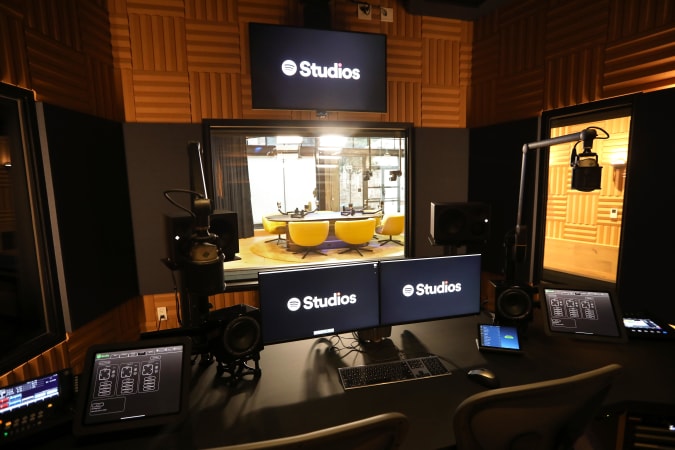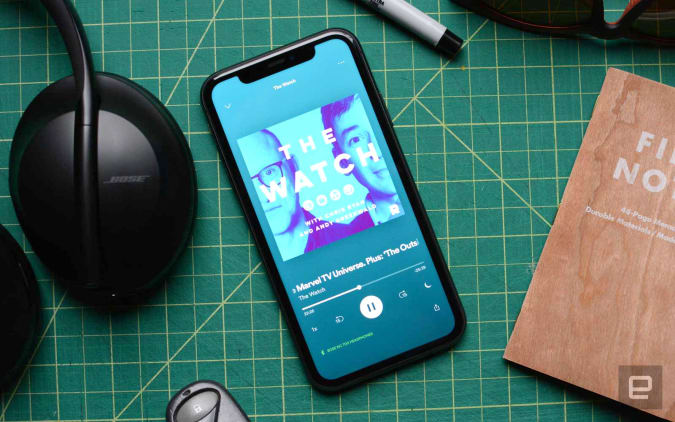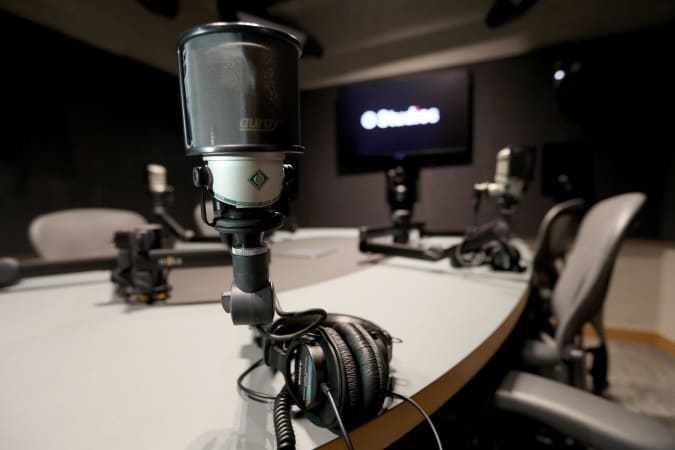Joe Rogan Hasnt Uploaded in a Week
From musicians pulling their music to a high-contour podcaster pausing their exclusive show, Spotify is under assail from all sides. Furore over Joe Rogan'southward podcast and Spotify'south subsequent misinformation policies and actions has come both internally and externally. Much of the backlash is warranted as Spotify hasn't been up front nearly the content of Rogan'south podcast, or misinformation in general. And the lack of transparency is why the company'due south current problems are much bigger than one massively pop creator.
Past at present, y'all've probable heard something most the Joe Rogan saga. The popular podcast host has been controversial for years, but criticism ramped upwards after a December 31 episode featuring physician and biochemist Dr. Robert Malone. While speaking to Rogan, Dr. Malone fabricated a number of unfounded claims well-nigh COVID-19 vaccines, including that "mass formation psychosis" led many in the US to take the jab. After the episode was posted, hundreds of doctors, nurses, scientists and educators sent a alphabetic character to Spotify urging information technology to create a clear misinformation policy and take "responsibility to mitigate the spread" of such content.
When the group posted the letter of the alphabet online, Engadget reached out to Spotify to ask if the visitor already had a misinformation policy, how it takes activity against misinformation and if it was because any activity against the Malone episode of JRE. The visitor didn't reply. Two weeks later, CEO Daniel Ek penned a statement on the matter and posted the company'south "platform rules" on a Sunday afternoon. It's unclear if Ek was already planning to publish the platform-wide policy or if it was in response to a report two days earlier of internal explanations to employees as to why certain episodes of Rogan's podcast hadn't been removed.
During the company's Q4 2021 earnings call last week, Ek took responsibleness for not publishing the content policy sooner. "We should've done it before and that's on me," he admitted. To employees during a company meeting the aforementioned day, the CEO explained that Spotify is not a publisher, so it doesn't have creative control over Rogan'due south show in accelerate. He said that since JRE is licensed content, it doesn't have oversight like it does for podcasts from The Ringer or Gimlet – production companies Spotify owns. "Nosotros don't approve his guests in advance, and but like whatsoever other creator, we become his content when he publishes, and and then we review it, and if it violates our policies, nosotros take the appropriate enforcement actions," Ek said.

Genaro Molina via Getty Images
Washington Post columnist Margaret Sullivan wrote this weekend that Spotify's "failure to accept any meaningful responsibility, other than adding a few disclaimers, is all too reminiscent of the way Facebook, for years, has dodged accountability for spreading so many harmful lies." And part of shirking responsibility comes in the course of Spotify's argument of a platform versus a publisher.
Spotify is a publisher, no thing what it says to the reverse. Paying a reported $100 million to lock down JRE equally an exclusive brings more responsibility for its content than a prove from "any other creator." Ek argued during that same speech to employees that "exclusivity does non equal endorsement" and that the solution is to secure "an fifty-fifty broader ready of exclusives that stand for even more voices." These two statements point to Spotify trying to build a foundation when the house is virtually finished.
A treasure trove of exclusives has helped make Spotify the number one podcast app in the Usa, according to Ek. Over the terminal few years, the company has purchased podcast production studios like Gimlet, Parcast and The Ringer, making shows sectional to its service along the mode. It has amassed a wealth of talent, including the near popular podcast globally on Spotify in Joe Rogan's prove. Sure sounds similar the behavior of a publisher.
One of Spotify's nigh of import podcast acquisitions was Anchor, an all-in-one production suite that made creating and publishing shows a breeze. The company has since leveraged its powerful advertisement setup for shows on the service and Ballast has regularly introduced new features to make recording even easier. It'southward literally a identify where anyone can publish a podcast and it has helped Spotify add over a million shows to its library. In tardily 2020, Spotify said Anchor accounted for seventy percentage of its podcasts, around 1.iii million at the time.

Billy Steele/Engadget
Nevertheless, Ballast'south own platform policy hasn't been updated since July 2021. At that place's no mention of COVID-nineteen misinformation, except for one item that bans any content that "conflicts with the Terms, as adamant past Spotify, collectively ('Objectionable Content')." Right now, that would include Spotify's recently published policy. However, until recently, those guidelines weren't public, and Anchor wasn't conspicuously displaying Spotify'due south policy. Now it's doing so via a clickable pop-up when you upload a evidence.
"Spotify's Platform Rules use to all content on Spotify, including Anchor," a Spotify spokesperson told Engadget. "We began highlighting our Platform Rules in our creator and publisher tools on February second to raise awareness around what's acceptable and assist creators sympathize their accountability for the content they post on our platform."
The lack of transparent guidelines is Spotify'due south biggest trouble. The upshot goes beyond Joe Rogan and covers the unabridged platform. When asked for comment about removing Neil Immature'southward music from the service (at his request), the company said it had "detailed content policies in identify and we've removed over twenty,000 podcast episodes related to COVID-xix since the commencement of the pandemic." Those policies were not made public until four days later. What'southward more than, when Engadget asked for information about the "over twenty,000" podcasts that had been pulled, Spotify didn't respond.
Correct now, nosotros but know about a few specific instances of content actions. So what happens when a creator who's not being paid a vault of coin espouses similar opinions to the ones Joe Rogan or his guests share on JRE? You know, the ones the company has already said "didn't meet the threshold for removal." On last week's earnings call, Ek was adamant that Spotify doesn't "modify our policies based on one creator nor do we alter it based on any media cycle, or calls from anyone else." However, a Media Matters analysis of Rogan's show going back to July 2020 highlights numerous times the podcast host has run afoul of the "long-standing" rules on violence or hatred toward marginalized communities and COVID-nineteen misinformation.
Spotify is maxim more than nigh the situation to employees than it is to the public, and none of it is sensitive info or trade secrets. Past addressing a major controversy in private, which is ultimately reported past the media, the company further erodes what trust it has left. The company hasn't publicly confirmed that it removed over lxx pre-Spotify-deal episodes of Joe Rogan's podcast for racist language, including utilise of the n-give-and-take, belatedly concluding week at Rogan'southward asking. But, once again, Ek acknowledged the move to employees internally. Why non but let an unnamed spokesperson confirm the details when asked? Particularly given Rogan himself addressed the content of those episodes in an apology video. The visitor also needs to open up nearly podcast removals and disclose what its review procedure is.

Genaro Molina via Getty Images
Spotify created a content policy, so information technology's clearly because how to police its platform. But what'south in place now is only a partial solution in demand of immediate expansion, explanation and revision earlier more damage is washed. Information technology's vague at a time where some specifics would go a long manner. This is not almost advocating for the company to "silence" Joe Rogan over his COVID views or anyone else who has been wrong on a podcast. Information technology's clear the company isn't going to do and then under the terms of its current bargain with the host anyhow. But a blanket warning label and mostly rationalizing its actions in individual isn't enough.
Of class, Spotify isn't the starting time large tech company to hibernate behind the "platform" label, especially when it comes to taking responsibleness for content. Facebook is perhaps the biggest example, as it has argued information technology's a engineering science platform rather than a publisher. CEO Marking Zuckerberg has said the company does bear some responsibleness for what's on the site only its actions accept been tepid at best. Facebook has also argued that information technology's a publisher when taking such a stance is beneficial in court. Twitter has made the same example, most notably when questioned on how it enforced a "hacked materials" policy regarding a story about Hunter Biden's laptop. "Is Twitter a publisher? No, nosotros are not. We distribute information," so-CEO Jack Dorsey told Congress. Department 230, the law that currently protects platforms from legal activity for things users post, enables companies to make the argument. And that'due south a big reason why Congress is looking to reform information technology.
Ek wrote in his virtually recent message to staff that "canceling voices is a slippery slope," and that's truthful. The outcome is the chief executive'southward mission to find "a balance," whether that's with a wider diversity of viewpoints or past every bit weighting "creator expression with user condom." Unless that balance comes with more than transparency and oversight, more book isn't going to solve annihilation.
All products recommended past Engadget are selected by our editorial team, independent of our parent visitor. Some of our stories include affiliate links. If you lot buy something through ane of these links, we may earn an affiliate commission.
Source: https://www.engadget.com/spotify-transparency-problem-joe-rogan-160014022.html
0 Response to "Joe Rogan Hasnt Uploaded in a Week"
Post a Comment